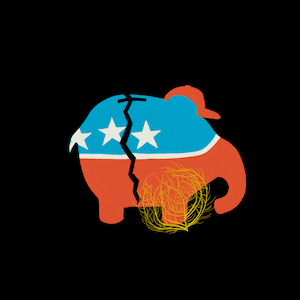Republican state legislators In North Carolina are establishing a new investigative body that Democratic critics have aptly compared to a “secret police force.”
This new entity, formally known as the Joint Legislative Committee on Government Operations, or “Gov Ops” for short, will be chaired by Senate Leader Phil Berger (R) and House Speaker Tim Moore (R). It grants the state the authority to investigate various matters, including “possible instances of misfeasance, malfeasance, nonfeasance, mismanagement, waste, abuse, or illegal conduct.”
Gov Ops, a product of North Carolina’s most recent state budget, was established via a comprehensive bill passed in late September. Despite Democratic Gov. Roy Cooper’s refusal to sign the legislation, the Republican majority in the state legislature pushed it through just 10 days later, thanks to their veto-proof majority and the state’s laws restricting the governor’s ability to make line-item vetoes. Gov Ops is slated to take effect next week.
Any way you slice it, Gov Ops seems like a recipe for government overreach and abuse. If you find yourself under investigation by Gov Ops, you won’t be allowed to publicly discuss any alleged constitutional violations or misconduct by the investigators. All communications with committee personnel would be treated as “confidential.” Shockingly, you’d also be denied the right to seek legal counsel regarding your rights if Gov Ops were to search your property without a warrant, irrespective of whether it’s in a public or private space.
Nora Benavidez, a senior counsel with the nonprofit advocacy group Free Press, told The Daily Beast, “This is a question for the courts ultimately. But the powers granted to the Gov Ops appear to give them overreaching investigative authority, which invokes constitutionality questions.”
A critical aspect of Gov Ops development lies in the language within the statute itself. The key phrase, as highlighted by Republican state legislators, is the investigation of “possible instances of misfeasance.”
It’s unsettling that North Carolina’s Republican state legislators are poised to wield unchecked partisan authority, devoid of any form of accountability, to determine what qualifies as “possible instances of misfeasance.” This newfound investigative power threatens to have far-reaching repercussions on fundamental civil liberties, particularly those closely intertwined with the state legislature—such as voting rights and abortion.
Consider the 2020 election aftermath. Following the election’s conclusion, several North Carolina Republican lawmakers—mirroring Trump and other far-right figures nationwide—demanded access to voting machines, relying on dubious sources and unfounded claims of voter fraud.
Initially, North Carolina Republicans asserted that they would work with police to obtain warrants for such inspections. However, with the advent of Gov Ops, committee leaders could now allege “possible instances of misfeasance,” eliminating the need for a warrant and keeping the public in the dark.
With the 2024 election looming, Republicans in the state legislature will redraw voting maps after the new conservative majority on the state’s Supreme Court legalized partisan gerrymandering. (The Princeton Gerrymandering Project called North Carolina one of the most gerrymandered states in the country.)
The redistricting process in the state has been grueling; since 2011, six different versions of maps have been drawn. The process has been conducted mainly behind closed doors, and North Carolinians continue to express frustration over how they’ve been locked out of the process.
A provision of Gov Ops will likely permit lawmakers drawing the maps to bypass public records requests: “lawmakers responding to public records requests will have no obligation to share any drafts or materials that guided their redistricting decisions.”
Now, let’s look at abortion. During a legislative hearing, state Sen. Graig Meyer (D) asked lawmakers, in a hypothetical scenario, if Gov Ops could access personal health records (like ultrasounds) that are required by the state to receive abortion pills. Sen. Meyer found that Gov Ops, with its widespread ability to investigate with zero oversight, could release information like this “to the public in a hearing” if it wanted to.
Benavidez explained, “At the end of the day, Gov Ops actions and requests for information are all protected as confidential, adding a layer of opacity which means people in North Carolina will have largely no idea what the Gov Ops entity is really doing.”
The consolidation of power by Republicans in North Carolina through Gov Ops is not just a cause for concern; it is a stark warning sign. The ability of state legislators to wield unchecked authority—shielded from the scrutiny of the voters they are obliged to serve—strikes at the heart of democratic principles.
Transparency and accountability are not optional in a democracy; they are its lifeblood.
When the process of drawing voting maps becomes cloaked in secrecy, when mechanisms to hold our elected officials accountable are dismantled, we risk losing our most cherished rights to our legislators, who should be our staunchest defenders.
Government powers like Gov Ops can potentially erode the very foundations of our democracy—which can’t work if politicians refuse to work for the people and have any accountability.









